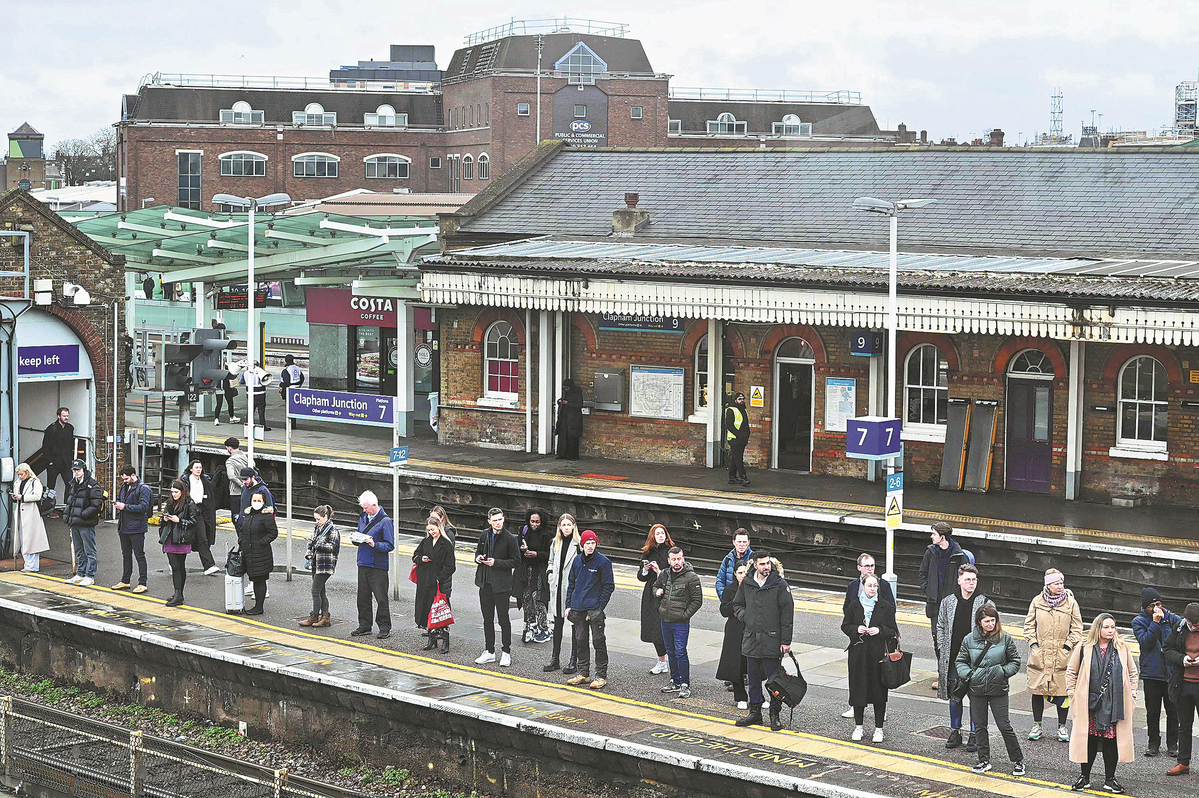Fresh strikes hit UK, disrupting transport
China Daily | Updated: 2023-03-18 08:12

Two 24-hour transport strikes hit the UK this week, with the London Underground impacted and bringing the capital to a near standstill on Wednesday, and a national rail strike the next day extending the disruption all over the country.
Tens of thousands of workers have taken part in the successive walkouts. Train services nationwide ground to a halt, with up to 3 in 5 routes impacted and some places left with no service at all.
The rail strike was the first in a series of four new walkouts in an ongoing dispute with train operators, with further strikes set for this Saturday, March 30 and April 1.
Before this new wave of industrial actions, the UK railway network has seen a total of 23 days of national strikes taking place from time to time, after negotiations between the operators and workers collapsed last summer.
The UK government and teaching unions agreed on Friday to begin "intensive" talks to end strikes by hundreds of thousands of teachers in England who say they are overburdened and underpaid.
Teachers could be one step closer to ending a wave of strike action that has left classrooms empty for several days this year.
On Thursday, the British government and healthcare unions agreed on a pay proposal with a 5 percent wage increase in the coming year and urged workers to accept it.
The new agreement would cover 1 million nurses, paramedics, midwives and other workers in England through early April 2024. The strikes will end only if members approve the deal after a period of consultation by trade unions, almost all of which recommended the new offer.
Britain is experiencing its worst wave of worker unrest since the 1980s, with strikes over pay affecting almost every aspect of daily life as inflation runs at a four-decade high of more than 10 percent.
In London on Wednesday morning, the underground strike meant commuters packed onto buses, overground trains and light rail services, which were running normally.
Roads gridlocked
Major roads were gridlocked as well, as people tried to drive to work. The Daily Mail Online cited data from Dutch multinational geolocation technology company TomTom that said there were 1,419 traffic jams in London, stretching for a total of 1,065 kilometers.
Some commuters told the Evening Standard they were "sick" of the constant strikes.
"I'm so tired of it, to be honest," said Liz McGinty, a 33-year-old retail worker who was waiting in a long line for a bus into western London. "Everyone is worried about the cost of living and your average worker's life is just being made more difficult. Not everyone can work from home and it's damaging the economy."
But Mick Lynch, general secretary of the National Union of Rail, Maritime and Transport Workers, or RMT, a trade union participating in both the train and tube walkouts, said workers will continue the industrial campaign for "as long as it takes".
For tube drivers and station workers, the "fight" is not only about pay, but also about changes, mainly pension reform and the planned axing of 500 to 600 station jobs, said Finn Brennan, district organizer for the Associated Society of Locomotive Engineers and Firemen, another trade union participating in the tube strike.
In a June funding deal agreed by the government and Transport for London, the operator of London Underground, TfL needs to reduce its pension costs by around 100 million pounds ($121 million) per year, in exchange for bailouts that are aimed at bridging TfL's financial losses caused by a drop in passenger numbers during the COVID-19 pandemic.
As a result of the lack of funding from the government, TfL wants to cut staff numbers and benefits, and change working conditions and pensions. But "our members aren't prepared to accept that", Brennan said.
The Independent newspaper reported that the rail dispute is "stuck in a deadlock", with Lynch saying the pay rise offered by train operators is not only "way below the inflation rate", but also contingent on changes in working conditions.
Zheng Wanyin and Han Jing in London, and agencies contributed to this story.






















